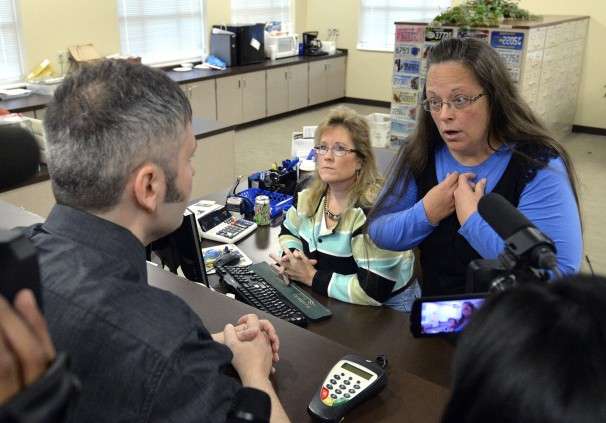The Volokh Conspiracy
Mostly law professors | Sometimes contrarian | Often libertarian | Always independent
Justice Scalia explained why Kim Davis should issue marriage licenses to same-sex couples or find a new job
http://www.washingtonpost.com/posttv/national/county-clerk-denies-same-sex-couple-marriage-license/2015/09/01/9732a5d0-50ba-11e5-b225-90edbd49f362_video.html
Kim Davis, the clerk of Rowan County, Ky., refuses to issue marriage licenses to same-sex couples because she believes same-sex marriage is immoral. According to Davis, her religious convictions prevent her from issuing the license: "To issue a marriage license which conflicts with God's definition of marriage, with my name affixed to the certificate, would violate my conscience."
In the wake of the Supreme Court's decision in Obergefell v. Hodges, Kentucky Gov. Steven Beshear ordered all county clerks in the state to issue marriage licenses to same-sex couples, but Davis refused. A federal district court ordered her to comply and issue such licenses, and she still refused. She sought relief in federal court, and even sought relief from the Supreme Court, but to no avail. She now risks contempt.
No justice publicly dissented from the Supreme Court's denial of Davis's plea for relief, and this was not surprising. The law on this point is clear. Davis cites her religious conscience as the excuse for her intransigence, but she is wrong to do so. That's not only my view, but the view of no less than Justice Antonin Scalia.

Davis has a right to observe and adhere to her religious beliefs, but she does not have a right to her job as county clerk. The latter obligates her to follow federal law, including the applicable judgments of federal courts, and it is now the law of the land that the Constitution bars state governments from refusing to recognize same-sex marriages on equal terms with opposite-sex marriages. If, as Davis claims, her religious convictions bar her from issuing such a marriage license, she should resign.
[Editorial: Kim Davis has to follow the law or find new work]
Now Scalia has not, to my knowledge, said anything directly about Davis's actions, but he has addressed the question of what public officials should do when their official obligations conflict with their religious conscience. Writing in "First Things" in 2002, Scalia explained that if he were to conclude that the death penalty is fundamentally immoral, he should no longer serve on the bench.
[W]hile my views on the morality of the death penalty have nothing to do with how I vote as a judge, they have a lot to do with whether I can or should be a judge at all. To put the point in the blunt terms employed by Justice Harold Blackmun towards the end of his career on the bench, when he announced that he would henceforth vote (as Justices William Brennan and Thurgood Marshall had previously done) to overturn all death sentences, when I sit on a Court that reviews and affirms capital convictions, I am part of "the machinery of death." My vote, when joined with at least four others, is, in most cases, the last step that permits an execution to proceed. I could not take part in that process if I believed what was being done to be immoral. . . .
[I]n my view the choice for the judge who believes the death penalty to be immoral is resignation, rather than simply ignoring duly enacted, constitutional laws and sabotaging death penalty cases. He has, after all, taken an oath to apply the laws and has been given no power to supplant them with rules of his own. Of course if he feels strongly enough he can go beyond mere resignation and lead a political campaign to abolish the death penalty" and if that fails, lead a revolution. But rewrite the laws he cannot do.
Davis is in a similar position. Her official position obligates her to take part in the state's licensing and recognition of marriages. Insofar as the state's definition of an acceptable marriage differs from her own, Davis is obligated to follow the state's rule so long as she maintains her current office.
[Column: County clerks can't exempt themselves from same-sex marriage ruling]
Think of it this way. Someone who objects to war due to his religious conscience has a right to be a conscientious objector and not serve in the military, even were there to be a draft. But he does not have the right to serve as a military officer, draw a paycheck from the military and then substitute his own personal views of when war is justified for that of the government. The same applies here.
If Davis believes the government's definition of marriage is fundamentally immoral and contrary to her religious convictions, she should remove her self from the state's machinery of marriage. That she has every right to do. What she does not have the right to do, however, is serve as a government official and fail to fulfill the obligations that come with that office.
UPDATE: Some readers object to the title of this post on the grounds that Justice Scalia's 2002 essay was not addressed to Kim Davis or the current controversy over same-sex marriage. Indeed, it would be hard for Scalia to have addressed this controversy in 2002. But the Scalia essay nonetheless "explains why" Davis should comply with the law or resign. This is because it explains why public officials should either fulfill their public obligations under the law or, should they feel precluded from fulfilling their obligations due to religious objections, resign from their position. That is the question Scalia addressed in 2002, and that is the question raised by Davis's appeal to religious conscience today. For that reason, I stand by the headline, with one modification. As originally posted, it read "Justice Scalia explains why Kim Davis should issue marriage licenses to same-sex couples or find a new job." I've revised it to put it in the past tense. Otherwise, I stand by the headline.


Show Comments (0)